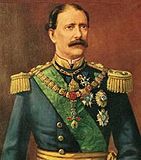
The president of France, officially the president of the French Republic, is the executive head of state of France, and the commander-in-chief of the French Armed Forces. As the presidency is the supreme magistracy of the country, the position is the highest office in France. The powers, functions and duties of prior presidential offices, in addition to their relation with the prime minister and government of France, have over time differed with the various constitutional documents since the Second Republic.

The islands of São Tomé and Príncipe were uninhabited at the time of the arrival of the Portuguese sometime between 1469 and 1471. After the islands were discovered by the explorers João de Santarém and Pêro Escobar, Portuguese navigators explored the islands and decided they would be a good location for bases to trade with the mainland.

The prime ministerof Sweden is the head of government of the Kingdom of Sweden. The prime minister and their cabinet exercise executive authority in the Kingdom of Sweden and are subject to the Parliament of Sweden. The prime minister is nominated by the speaker of the Riksdag and is elected by the chamber by simple majority, using negative parliamentarianism. The Riksdag holds elections every four years, in the even year between leap years.

The prime minister of France, officially the prime minister of the French Republic, is the head of government of the French Republic and the leader of the Council of Ministers.

The prime minister of Portugal is the head of government of Portugal. As head of government, the prime minister coordinates the actions of ministers, represents the Government of Portugal to the other bodies of state, is accountable to parliament and keeps the president informed. The prime minister can hold the role of head of government with the portfolio of one or more ministries. As Portugal is a semi-presidential parliamentary republic, the prime minister is the country's leading political figure and de facto chief executive.
Minister of state is a designation for a government minister, with varying meanings in different jurisdictions. In a number of European countries, the title is given as an honorific conferring a higher rank, often bestowed upon senior ministers. In the United Kingdom and several other Commonwealth countries, "minister of state" is a junior rank subordinate to ministers of higher rank. In Brazil and Japan, all ministers of cabinet rank hold the title, while in Australia "minister of state" is the designation applied to all government ministers regardless of rank.

Fernando da Piedade Dias dos Santos, known as Nandó, is an Angolan politician who was the first vice president of Angola from February 2010 to September 2012. He was the prime minister of Angola from 2002 to 2008 and president of the National Assembly of Angola from 2008 to 2010. He has again served as president of the National Assembly from 2012 to 2022.

The president of Portugal, officially the president of the Portuguese Republic, is the head of state and highest office of Portugal.

Américo de Deus Rodrigues Tomás was a Portuguese Navy officer and politician who served as the 13th president of Portugal from 1958 to 1974. He was the last president of the authoritarian and corporatist Estado Novo.

The prime minister of East Timor, officially the Prime Minister of the Democratic Republic of Timor Leste, is the head of government in East Timor.

The deputy prime minister of India, although not a Constitutional post, is the second-highest ranking minister of the Union in the executive branch of the Government of India and is a senior member of the Union Council of Ministers. The office holder also deputises for the prime minister in their absence.

Manuel de Oliveira Gomes da Costa, commonly known as Manuel Gomes da Costa or just Gomes da Costa, was a Portuguese army officer and politician, the tenth president of Portugal and the second of the National Dictatorship.
Historically, the political post of Prime Minister, officially called President of the Council of Ministers, existed in Brazil in two different periods: from 1847 to 1889 and from 1961 to 1963.
The title secretary of state or state's secretary is commonly used for senior or mid-level posts in governments around the world. The role varies between countries, and in some cases there are multiple secretaries of state in the country's system of governing the country.

Palacete de São Bento, formally the Official Residence of the Prime Minister, is a late 19th-century mansion that presently serves as the official residence of the prime minister of Portugal. It is located in the Lisbon civil parish of Estrela, within the grounds of São Bento Palace, the seat of the Portuguese parliament.
This page is based on this
Wikipedia article Text is available under the
CC BY-SA 4.0 license; additional terms may apply.
Images, videos and audio are available under their respective licenses.















